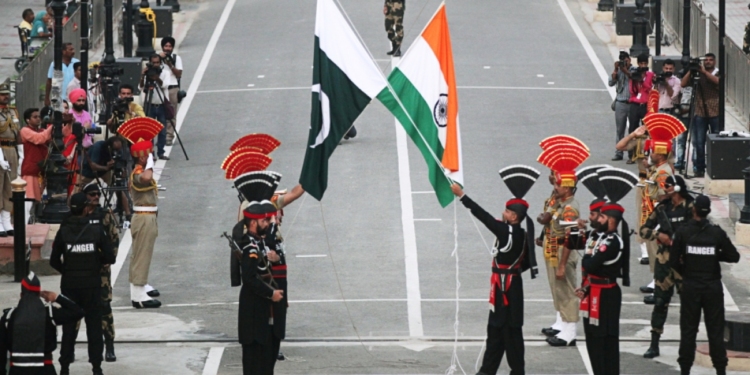By incorrectly accusing Pakistan, India’s false flag operations in IIOJK deceive the world and jeopardize peace. Experts urge global action for the real truth.
India’s False Flag Operations:
Attacks that take place inside India’s borders, particularly in Indian Illegally Occupied Jammu and Kashmir (IIOJK), have traditionally been attributed to Pakistan. Numerous political analysts and defense specialists claim that India utilises these crises as cover for its internal shortcomings. These acts endanger regional peace in addition to deceiving the world.
In the Pahalgam neighborhood of IIOJK, there was a recent attack on visitors. In the Indian media, this information circulated swiftly. Indian press outlets and social media accounts affiliated with its intelligence agency, RAW, began accusing Pakistan without conducting any inquiry. This pattern has been observed numerous times in the past.
Familiar Pattern of False Blame:
According to former foreign secretary Jalil Abbas Jilani, India has a habit of accusing Pakistan whenever anything goes wrong on its side. He recalled that Sikhs were killed in IIOJK in 2000 while US President Bill Clinton was in India. Even then, India blamed Pakistan without any proof.
Expert Opinion:
Defence analyst Dr Qamar Cheema called the recent Pahalgam incident a false flag operation. He said that India often kills its people to gain political and strategic benefits. This is a very serious accusation, but unfortunately, it matches many past events where India tried to shift the world’s attention away from its internal problems.
Dr Qamar further added that Pakistan itself is facing many terrorist threats, especially in regions like Balochistan and Khyber Pakhtunkhwa. Pakistan does not benefit from such attacks in IIOJK. Instead, it wants peace in the region.
Why Target Tourists?
Experts believe that the attackers in Pahalgam specifically targeted non-Muslim tourists. The reason for this may be to spread fear and justify more strict actions by Indian security forces in IIOJK. By doing this, India creates an excuse to increase its military presence in the region and further oppress the local Muslim population.
What makes this attack even more suspicious is its timing. It happened when the Vice President of the United States was visiting India. Many analysts believe this was not a coincidence. India may have wanted to gain sympathy and support from the US by playing the victim card once again.
This has happened before. Whenever a big leader from another country visits India, some “incident” takes place in IIOJK or somewhere else. After the event, Indian officials quickly start blaming Pakistan, even if no proof is available.
Political Games by the Modi Government:
Indian Prime Minister Narendra Modi and his government have used similar tactics many times. When elections are near or when the government is under criticism for economic or social failures, a false flag operation often happens. This strategy shifts public focus from real issues to national security. This trick helped Modi gain more votes by creating fear and hate against Pakistan. It also keeps the Indian public distracted from rising inflation, unemployment, and social unrest.
Condition in Occupied Kashmir:
IIOJK has been under heavy military control for many years. After the removal of Article 370 in 2019, the situation got worse. The Indian government promised development and peace in the region, but instead, the local people have faced more violence and restrictions. International human rights groups have reported many cases of torture, illegal arrests, and even killings by Indian forces. But instead of fixing these problems, India tries to hide them through false propaganda.
Media as a Weapon:
Indian media plays a big role in spreading this false narrative. Many news channels do not ask questions or wait for proof. Instead, they repeat whatever the government says. This brainwashes the Indian public and makes them believe that Pakistan is the enemy.
This kind of journalism is not only unethical but also dangerous. It increases hatred and creates a war-like environment in the region.
Impact on Regional Peace:
Pakistan has always called for peace and dialogue, especially over the Kashmir issue. But India refuses to talk and continues blaming Pakistan for every small or big incident. This behaviour harms the peace process and increases tension between two nuclear-armed countries. If false flag operations continue, there is always a danger that a small incident could turn into a big war.
Pakistan’s Response:
Pakistan has strongly denied any involvement in the Pahalgam incident. Officials from the Foreign Office and defence analysts have asked the international community to notice India’s dirty games. Pakistan has also offered to cooperate in any fair investigation led by international agencies. But sadly, many global powers remain silent because of their own political and economic interests with India.
False Flag Incidents Blamed on Pakistan by India:
| Year | Incident | Blame by India | Expert’s View |
| 2000 | Chittisinghpura Massacre during Bill Clinton’s visit | Pakistan blamed | Widely believed to be a false flag |
| 2016 | Uri Army Base Attack | Pakistan blamed | No conclusive proof provided |
| 2019 | Pulwama Attack | Pakistan blamed | India attacked Balakot afterwards; no solid evidence shared |
| 2025 | Pahalgam Tourist Attack | Pakistan blamed | Analysts call it a false flag, done during the US VP’s visit |
Final Thoughts:
India now routinely uses media misinformation and false flag operations to hide its political and internal security shortcomings. India runs the risk of igniting an unnecessary war and escalating regional tensions by continuously accusing Pakistan.
The world needs to wake up and realise how grave these acts are. Real people are harmed by false narratives, particularly the innocent Kashmiri people who are still suffering. It’s time to put an end to assigning blame and begin concentrating on true peace. Pakistan must keep speaking the truth and demanding attention from around the world. The battle is for South Asia’s safety and future, not merely for the country’s reputation.























